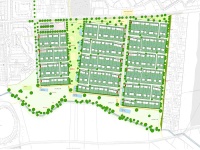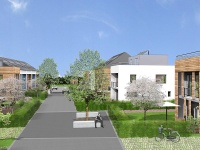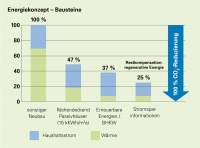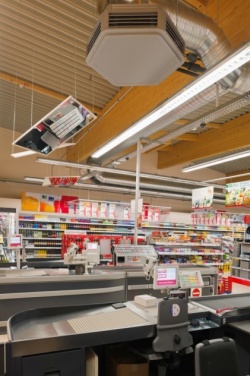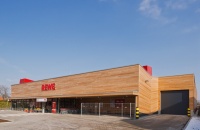Zero:e park, Hannover
Contents
The first European settlement with passive houses and zero emission standard
By building nothing but Passive Houses in the ZERO:E park in Hirtenbach in southwestern Hanover, the City faces the challenge of building a new residential area with 330 single family homes as a zero-emissions neighborhood. The plan is based on an innovative concept which ecological objectives are derived from the Kronsberg neighborhood, which was built more than ten years ago for Expo 2000. Overall, the new neighborhood will not emit any carbon from heat supply and household electricity. The ZERO:E park in Hirtenbach, based on the Kronsberg neighborhood (1999), is thus another milestone for Hanover’s climate protection objectives. The basic principle of the energy concept is to bring the houses’ heat demand to a minimum thanks to energy efficient construction with passive and active use of solar energy; taking the use of renewables into consideration, only a small amount should need to be compensated for outside of the neighborhood. For heat supply, average residual carbon emissions were calculated to be 900 kg/year per house. Compared to a neighborhood built only to the current legal standard (EnEV 2009), consistent application of the Passive House Standard reduces greenhouse gas emissions from heating by 65 to 87%. Costs for heat supply are Important aspects of the ZERO:E park include: • constructing all buildings as Passive Houses • using solar thermal energy to reduce residual energy demand • using household appliances that consume electricity efficiently • compensating for remaining carbon emissions from heat and household electricity demand with renewable energy production facilities For the entire neighborhood to achieve climate neutrality, compensation for heating and household power was calculated to be an average of 1,300 MWh; this amount is to be covered with electricity from a reactivated hydro powerplant.
Certified Passive supermarket
The Zero e-Park will also house the first certified Passive supermarket.
Downloads
Download description Zero e-Park project in English
Download description Zero e-Park project in Dutch
Download description passive supermarket in English
Download description passive supermarket in Dutch
More information
Local ecological standards in Hannover
Zero e-Park Klimaschutzsiedlung „Am Hirtenbach“
Zero e-Park - Zero emission settlement in Hannover
Website developer/builder Interhomes AG
Website developer Meravis with short videoclip on the Zero e-Park project
Website architekten Schäfer Kreuse Schulz
Webpage Passipedia on supermarkets
